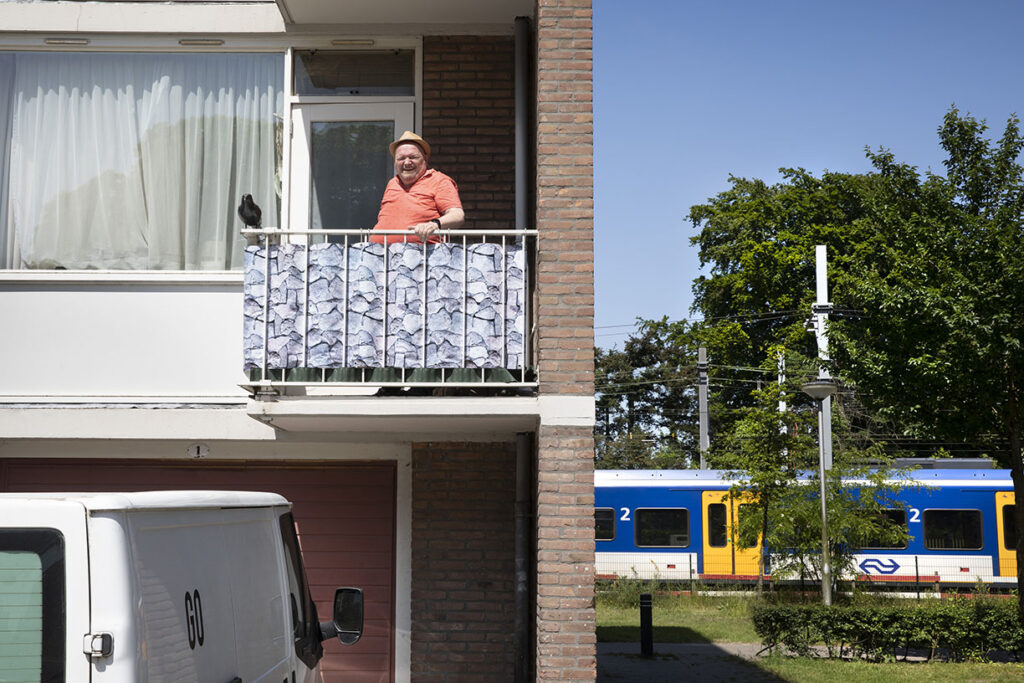Alex: ‘I’m allergic to change’
Alex (66) is a born and raised Tilburg citizen. His apartment in the Munttorenflat marked a new beginning for him. Twice a week he manages Het Muntje, a common room where local residents have a cup of coffee and a chat.

What does an average day look like for you?
‘When I get up in the morning I often crawl behind my laptop first thing. Or I make things with yarn, like sateh sticks that you can stretch colored thread around. Sometimes it takes me half an hour, sometimes three hours. I also watch TV and I sleep a lot. Due to mental and physical complaints, including a pacemaker and sleep apnea, I can’t do as much in a day these days.’
Was that ever different?
‘For thirty-five years, I worked for a large electronics company, but it went out of business in 2011. There, I did all kinds of different jobs. My last job was stocking different branches with, for example, ballpoint pens, sponges, and price tag holders. After two years of making a loss, one afternoon I heard, ‘You don’t have to come in tomorrow.’ You don’t believe that at first. I’m allergic to change, so that was a tough time for me.’
Who are our neighbors?
Anyone walking from Tilburg University station to the campus invariably passes a trio of large flats. They are right next to the railroad tracks and all three were built in 1961 by housing corporation Tiwos. The residents are the immediate neighbors of Tilburg University. Univers wondered who these neighbors actually are and how they experience living next to the ever-expanding knowledge institution. These are their stories.
How did you end up in this place?
‘I was a hoarder, a real hoarder. I collected a lot of stuff and empty microwave containers were everywhere. At one point, I had to move out of my house. Because I lost my father and brother shortly before, I got the chance to make a new start. In a new environment. That turned out to be the Munttorenflat.
‘Now I have supervision. A domestic help and a personal attendant. I’m also under voluntary guardianship. And that’s great. The fixed income and expenses are taken care of, and I get a certain amount of living expenses. If I need extra money for something expensive, I can ask for it or claim it. The other day I got vacation money and I bought Skechers with it.’
Do you like living here?
‘I like it here. I live on the second floor, an apartment with a spacious living room and two bedrooms. You’re close to the supermarket on the Professor de Moorplein and the Westermarkt is also nearby. By train and bus I am in the city in no time. I have no partner, no children, and no dog nagging me. I have my comforts and can do whatever I want.’
‘To the noise of the railroad, I have become accustomed. If you keep the windows and doors closed you hear very little. When it’s dead quiet I sometimes hear the freight train, but it doesn’t bother me at all.’
What is the atmosphere like in your apartment?
‘The neighbors I have the most contact with are the Syrians who came to live here in 2020. Just greeting and having a chat. And there’s a neighbor who keeps an eye on me a bit after my surgery for a pacemaker. With her, I also manage Het Muntje. That’s a converted garage box here at the bottom of the apartment block, where local residents can have coffee twice a week.’
Who usually comes to Het Muntje?
‘Neighbors and sometimes a stray guest. Usually, it’s the older generation that comes breezing in, to be among people and have a chat.
‘We are open on Tuesday and Friday afternoons. Usually four to five people come. We discuss all kinds of things. You can also come here if you are having problems. Every two weeks, neighborhood partners such as Contour de Twern, the municipality, special investigating officers, or the police visit. You can ask them questions then.’
The university as a neighbor, how do you like it?
‘I kind of like it, that stream of ‘ants’ walking out of the train toward campus every day. I hardly ever go there myself. I used to eat at the Mensa at times. Back then you could get a daily snack for something like 5 euros. But now I think, No way, I can eat much cheaper at home for those 5 euros.’
‘And before the opening of the cube, the Cube you call it, we got an invitation to see how it was all laid out. I went there with some local residents to see it.’
Will you be living here for the time being?
‘Yes indeed, unless they tear things down. There is talk of that. Then there will be new flats, but they are smaller. If I have to move out, I will stay out. Otherwise you have to move twice, first to temporary housing and then back to the new apartment. If I were younger, I could do that. But on my own? No, then I’ll go and live somewhere else.’
Translated by Language Center, Riet Bettonviel






